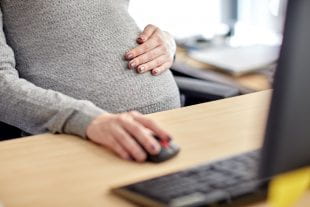NEWS RELEASE
Amy McCaig
713-348-6777
amym@rice.edu
Helping pregnant women at work can hurt their chances of returning after maternity leave
HOUSTON – (Oct. 2, 2019) – Courteous people routinely give up a seat on a bus, open a door or extend some other form of kindness to a pregnant woman. But when colleagues at work try to lighten a pregnant woman’s load, it can hurt her chances of returning to work after giving birth, according to new research from Rice University, the University of Memphis, Boston College and the University of Massachusetts Lowell.
“How Help During Pregnancy Can Undermine Self-Efficacy and Increase Postpartum Intentions to Quit” will appear in an upcoming edition of Personnel Psychology. The researchers, including Eden King, an associate professor of psychological sciences at Rice, were interested in how benevolent sexism — the belief, rooted in traditional gender roles, that men and women are better or worse at certain things — impacts a woman’s feelings about her career during and following pregnancy.
The researchers surveyed 105 women on a weekly basis during their pregnancies and for nine months postpartum. They asked the women how often they experienced “helpful” behavior at work — for example, co-workers trying to shield them from unpleasant news, giving them easier tasks or assigning them lighter workloads. They also asked the women how this behavior made them feel about their work abilities.
Overall, they found that this “helpful” behavior – regardless of whether the women thought of it as helpful or harmful to their productivity — ultimately made them feel worse about themselves and their workplace abilities. When the women perceived the help as harmful to their productivity, it made them feel even less confident in their abilities. The worse these women felt about their abilities, King said, the less likely they were to return to the workforce following maternity leave.
Oftentimes, this form of sexism can come across as positive or even complimentary — for example, wanting to treat a pregnant woman with kindness or shield her from unpleasantness at work, King said. However, she said this research clearly indicates it can have a long-lasting negative impact on mothers’ careers.
King and her fellow researchers hope this study will shed light on how subtle forms of sexism can impact people in the workplace and beyond.
Kristen Jones from the University of Memphis is the study’s lead author. Co-authors include Judith Clair of Boston College, Beth Humberd of the University of Massachusetts Lowell and David Arena from the University of Memphis.
To request a copy of the study or interview the researchers, contact Amy McCaig, senior media relations specialist at Rice, at 713-348-6777 or amym@rice.edu.
-30-
Read the abstract at https://onlinelibrary.wiley.com/doi/abs/10.1111/peps.12365?af=R.
This news release can be found online at news.rice.edu.
Follow Rice News and Media Relations via Twitter @RiceUNews.
Related materials:
Photo link: https://news2.rice.edu/files/2019/10/76358439_l.jpg
Photo credit: 123rf.com
Eden King bio: https://psychology.rice.edu/eden-king
Located on a 300-acre forested campus in Houston, Rice University is consistently ranked among the nation’s top 20 universities by U.S. News & World Report. Rice has highly respected schools of Architecture, Business, Continuing Studies, Engineering, Humanities, Music, Natural Sciences and Social Sciences and is home to the Baker Institute for Public Policy. With 3,962 undergraduates and 3,027 graduate students, Rice’s undergraduate student-to-faculty ratio is just under 6-to-1. Its residential college system builds close-knit communities and lifelong friendships, just one reason why Rice is ranked No. 1 for lots of race/class interaction and No. 4 for quality of life by the Princeton Review. Rice is also rated as a best value among private universities by Kiplinger’s Personal Finance.


